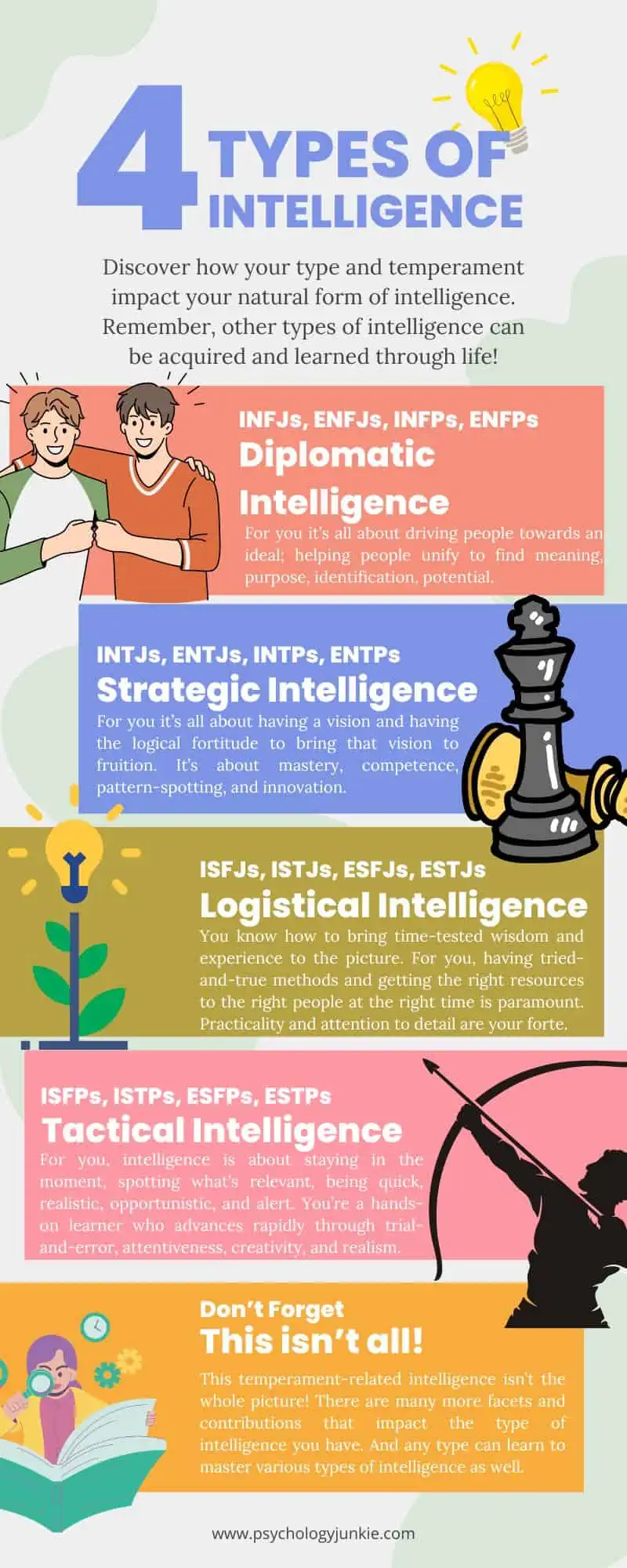The Unique Intelligence of Each Myers-Briggs® Personality Type
Are some personality types smarter than others? This is a question I get almost every day as an MBTI® practitioner. Everyone wants to know where they stack up on the intelligence scale, but the question doesn’t have a simple answer.
First off, no one personality type is inherently “smarter” than others simply due to their type. Each type, from the introspective INFJ to the outgoing ESFP, possesses a distinct kind of intelligence that is greatly needed in our world. And we can also learn to master types of intelligence that aren’t innate to our personality type. There’s our innate intelligence and then there’s learned intelligence; type is not meant to box anyone in and say they can’t learn or posses talents simply because they have a four-letter code.

Not sure what your personality type is? Take our new personality questionnaire here. Or you can take the official MBTI® here.
Estimated reading time: 18 minutes
A Psychologist’s Take On Personality and Intelligence:
Educational psychologist David Keirsey discovered that the 16 Myers-Briggs® personality types could be sorted into four distinct temperaments, each possessing a unique style of intelligence. His groundbreaking book, “Please Understand Me”, explored and illuminated the profound connections between type, temperament, and their impact on various aspects of life such as relationships, education, and parenting. The book resonated with a vast audience, selling more than 2 million copies. His Keirsey Temperament Sorter, a tool designed to classify individuals into these four temperaments, has been used by over 40 million individuals, further highlighting its far-reaching influence!
Let’s start our exploration of type and intelligence by looking at Keirsey’s temperaments and seeing the unique type of intelligence they each possess.
The Idealist (NF) Personality Types and Intelligence
If you’re an INFJ, INFP, ENFJ, or ENFP you belong in the “Idealist” temperament group. Idealists are known for their empathy, abstract focus, and desire for significance and personal meaning. Keirsey states that Idealists have diplomatic intelligence.
Diplomatic intelligence is about shifting into other points of view and empathizing with a wide variety of people. They see connections between things, spot patterns, and grasp where others are coming from. For the Idealist, intelligence isn’t just about grasping numbers and equations (although they may also be good at that), it’s about spotting potential, meaning, and purpose. Many NF personality types act as guides and mentors, drawing others towards their potential and showing them their path. Some act as peacemakers, highlighting the human values we all share and getting people to see others’ humanity and shared struggles rather than simply what makes people different. Others help people access their innermost desires and dreams, inspiring them with the belief that it is possible to live more authentically and purposefully.
Without Idealists, our world would lack the profound emotional connectivity and understanding that this temperament brings. The Idealist’s ability to empathize deeply and view situations from various perspectives leads to a more compassionate, tolerant society. The Idealists’ pursuit of meaning and purpose contributes significantly to societal progress, as they often challenge the status quo and strive for a better world. They inspire those around them to aim higher, dream bigger, and strive harder, acting as catalysts for personal growth and transformation. In essence, Idealists play a vital role in adding emotional depth, empathy, and purpose to our world, making their contribution indispensable.
Idealists – Who They Are:
- INFJs
- INFPs
- ENFJs
- ENFPs
Idealists – What They Notice:
- Relationships between people
- Emotional wavelengths
- Ethical considerations
- Authenticity, or lack thereof
- Integrity, or lack thereof
- Abstract patterns and connections
- Potential
INFJ and ENFJ Intelligence:
INFJs and ENFJs possess an extraordinary ability to perceive patterns, discern implications, and envision profound meanings for the future. They are visionaries, empathizers, and forecasters. With deep consideration for the interconnectedness of all things, they bear a great sense of responsibility towards the impact they have on others. Most NFJs effortlessly establish rapport and foster an atmosphere of warmth and understanding. Others find solace in their presence, often opening up and sharing their deepest emotions. It is not uncommon for NFJs to feel as though they have absorbed the life stories of everyone they meet, even in the earliest stages of their relationships.
NFJs are often burdened by the sense that others’ feelings are theirs to take care of and tend to. Sometimes this can make them influential mentors, teachers, and guides, and at other times it can make them codependent; feeling overly responsible for everyone else to the point of exhaustion.
INFJ and ENFJ Talents:
- Foreseeing
- Conceptualizing
- Pattern-spotting
- Empathizing
- Grasping potential
- Predicting a relational or emotional outcome
- Envisioning a path for growth
- Reconciling people
- Developing ideas
- Spotting relationships
Famous INFJs and ENFJs:
- Oprah Winfrey
- Nelson Mandela
- Mahatma Gandhi
- Dante Alighieri
- Leo Tolstoy
- David Fincher
- Martin Luther King Jr.
Find out more about INFJs and ENFJs:
24 Signs You’re an INFJ, the Mystic Personality Type
The ENFJ Personality Type In-Depth
INFP and ENFP Intelligence:
INFPs and ENFPs excel in their ability to comprehend motives, intonation, and authenticity. They possess an uncanny ability to discern when others are not being “real” or genuine, and they have a knack for zeroing in on what’s not being said and the motivations and desires that people don’t overtly share. This can give INFPs and ENFPs the aura of seeing “through” people to their actual selves. Sometimes people love this and sometimes they hate it; it all depends on the individual!
NFPs are proficient in understanding metaphors, creating possibilities, and spotting incongruities, especially in situations where there is a mismatch between what people profess to believe or value and their actions. They are adept at noticing threads of meaning, scanning for potential outcomes, and making intuitive interpretations based on the information they gather.
INFP and ENFP talents:
- Understanding motives
- Discerning authenticity
- Perceiving unspoken truths
- Spotting hypocrisy
- Noticing threads of meaning
- Creating possibilities
- Guiding others to their authentic selves
- Inferring relationships
- Generating hypotheses
Famous INFPs and ENFPs:
- William Shakespeare
- J.R.R. Tolkien
- George Orwell
- John Lennon
- Mark Twain
- Anne Frank
- Audrey Hepburn
- Robin Williams
- Bob Dylan
Find out more about INFPs and ENFPs:
An In-Depth Guide to How INFPs and ENFPs Think
The Rational (NT) Personality Types and Intelligence
Rationals, comprising of INTJs, ENTJs, INTPs, and ENTPs, are the strategists of the MBTI world. They are characterized by their remarkable ability to envision a future state, then meticulously reverse engineer the path to create it. Strategists are not content with merely accepting the status quo; they constantly experiment, innovate, and challenge the conventional wisdom.
Their minds are ceaselessly buzzing with theories and ideas waiting to be tested and integrated into new philosophies. They hold a unique ability to think outside the box, questioning and debating as they strive to broaden their understanding and perspectives. This constant thirst for knowledge and discovery is what drives their intellectual journey, making them ideal architects for the future.
Strategists possess an inherent talent for logical thought. They know how to break down complex problems into simpler, manageable parts. But they also have an uncanny ability to identify patterns and interconnections between seemingly disparate entities, allowing them to construct comprehensive models of reality. Innovating, thinking outside-the-box, trailblazing new paths in thought and invention are things that drive them.
In their pursuit of excellence, Strategists desire self-mastery and competence in all areas. They continually push their boundaries, seeking to improve their skills and knowledge. This constant striving for personal growth and self-improvement is not just for personal fulfillment, but also to contribute meaningfully to the world around them.
In essence, Strategists embody the power of visionary thinking backed by intellectual rigor. They inspire us to refuse complacency, to question, to challenge, and to constantly strive for better. They teach us that every status quo was once an innovation and every innovation can become the status quo. It is this relentless pursuit of knowledge and improvement that makes Strategists an invaluable part of our society.
Rationals – Who They Are:
- INTJs
- ENTJs
- INTPs
- ENTPs
Rationals – What They Notice:
- Patterns
- Connections between things
- Systems & processes
- Competency
- Opportunities for innovation
- Logical inconsistencies
- Logical fallacies
- Principles
- Unformed possibilities
INTJ and ENTJ Intelligence:
INTJs and ENTJs have a long-range vision for the future and a unique ability to pave the way towards as-yet-unknown possibilities. They can weigh many different tasks and responsibilities at once, continually reshaping their plans to effectively meet their goals. These are the people you want when you have a compelling idea but don’t know where to begin. They’re also the people you want to talk to if you’re trying to get to the root of a big, conceptual idea and you want to debate, theorize, or understand it better. Their world is arranged swiftly and methodically, underpinned by trust in logic and empirical reasoning, enabling them to tread confidently towards progress and achievement. They possess a unique aptitude for conceiving a concept or system and guiding others not only to grasp it but also to transcend it.
These personality types usually delve into ideas and theories independently and present them to a group or others only when completely refined. In their quiet spaces they are intensely focused; getting to the bottom of their plans, concepts, ideas, and strategies. Around others they can be powerful leaders, keeping every one on track towards far-reaching objectives. As visionary organizers, they have an innate understanding of the sequence of actions required to realize a goal or bring a novel idea to life. Their propensity to think long-term underlines their strategy for accomplishment. This distinctive combination of foresight, organization, and direction makes them especially adept at steering others towards a shared vision for the future.
INTJ and ENTJ Talents:
- Foreseeing
- Organizing
- Long-range thinking
- Conceptualizing
- Relating theory to practice
- Teaching and guiding
- Logical reasoning
- Empirical thinking
- Pattern-spotting
Famous INTJs and ENTJs:
- Isaac Newton
- Nikola Tesla
- Napoleon Bonaparte
- Julius Caesar
- Ayn Rand
- Jay-Z
Find out more about INTJs and ENTJs:
24 Signs That You’re an INTJ, the Strategist Personality Type
INTP and ENTP Intelligence:
INTPs and ENTPs, the ingenious innovators of the Myers-Briggs world, display a unique blend of intellectual curiosity, creative problem solving, and analytical prowess. Unlike INTJs and ENTJs who are more result-oriented, INTPs and ENTPs are process centers, reveling in the journey of discovery, experimentation, and ideation. Their minds are constantly buzzing with ideas and theories as they systematically test, analyze, and refine their hypotheses.
With their keen eye for spotting incongruities, these personality types excel at identifying errors, inconsistencies, and logical fallacies. They intuitively notice categories and draw connections between them, constantly forming and re-forming mental models and frameworks to encapsulate their evolving understanding.
Being natural strategists, they excel at devising innovative solutions and alternative approaches. They thrive in environments with a loose structure, where they have the freedom and flexibility to explore various possibilities without being constrained by a strict schedule or agenda.
NTPs possess extraordinary observational skills, noticing threads of meaning, inferring relationships, and figuring out how things or ideas work. This cognitive flexibility and adaptability, coupled with their relentless intellectual curiosity, make INTPs and ENTPs formidable problem solvers and creative thinkers.
INTP and ENTP Talents:
- Spotting inconsistencies
- Creating and refining hypotheses
- Devising innovative strategies
- Observing and categorizing
- Analyzing and problem-solving
- Inferring relationships
- Creating mental models and frameworks
- Grasping the principles of how things work
Famous INTPs and ENTPs:
- Albert Einstein
- Charles Darwin
- Thomas Edison
- Leonardo da Vinci
- Catherine the Great
- Steve Wozniak
- Marie Curie
The Artisan (SP) Personality Types and Intelligence:
Artisans (ISTPs, ESTPs, ISFPs, and ESFPs) possess a unique brand of tactical intelligence that sets them apart. This intelligence, sharply focused on the present, enables them to rapidly comprehend the context of the moment and effectively manage situations as they unfold. Whereas intuitive types (N types) may need time to conceptualize and are more into exploring abstract ideas, Artisans thrive on immediate action, quick decision-making, and on-the-fly problem-solving.
Artisans are adept at reading the room, tuning into the subtle nuances of social interactions, and adjusting their behavior to achieve the desired results. Their practical smarts, combined with their ability to think on their feet, allow them to navigate any situation with agility and “street smarts”. They’re masters of trial and error, quickly learning new techniques and applying them across a variety of scenarios.
Despite these intellectual strengths, Artisans seldom flaunt their intelligence. They are realists who focus on tangible facts and reality, often dismissing theoretical or abstract concepts that seem detached from the immediate, practical world. Their intelligence shines through their actions as they tackle real-world problems with ingenuity, adaptability, and a keen sense of immediacy.
Artisans are testament to the adage “actions speak louder than words.” Their intelligence is not displayed through verbose explanations or complicated theories, but through their adeptness at handling real-world scenarios with deftness and dexterity.
Artisans – Who They Are:
- ISTPs
- ESTPS
- ISFPs
- ESFPs
Artisans – What They Notice:
- Immediate context
- What’s relevant now
- Practical facts and data
- Physical sensations
- Opportunities to maximize
- The “mood of the room”
- Line, colors, forms, textures
- Sounds, rhythms, fluctuations
- Visceral responses
You might also enjoy:
Inspiring Morning Routines for INTPs, ENTPs, INTJs, and ENTJs
ISTP and ESTP Intelligence:
ISTPs and ESTPs, renowned for their practical intelligence and tactical prowess, exhibit an uncanny ability to circumnavigate rules and obstacles with ease. Their minds function as sophisticated radar systems, constantly scanning their environment, gathering facts, and identifying potential leverage points. This ability to effortlessly comprehend their surroundings allows them to employ anything in their environment as a tool to achieve their desired results.
Their intelligence is marked by an agile problem-solving ability. When faced with challenges, ISTPs and ESTPs adapt their techniques, swiftly adjusting their strategy to tackle the issue head-on. They excel at identifying the fulcrum of a problem, enabling them to apply the right amount of force at the right place to shift even the most challenging obstacles.
Learning for these Myers-Briggs types is an experiential process. They thrive in the throes of competition, where they can put their tactical abilities to the test and learn from the dynamics of the challenge. The thrill of competition serves to heighten their focus, sharpening their ability to analyze, categorize, and understand how systems work.
Their expertise lies in experiencing the physical world. They’re masterful observers who scan their environment for useful information and opportunities. Their agility, adaptability, and acuity in reading their environment can make them formidable opponents or incredible helpers during crisis situations.
ISTP and ESTP Talents:
- Swiftly maneuvering around rules and obstacles
- Rapid comprehension of their environment
- Tactical use of environmental tools
- Experiential learning and adaptation of techniques
- Competing and testing their abilities
- Observing and analyzing the physical world
- Identifying relevant opportunities
- Analyzing, categorizing, and understanding systems
Famous ISTPs and ESTPs:
- Bruce Lee
- Jack Dorsey
- Magnus Carlsen
- Clint Eastwood
- Malcolm X
- Winston Churchill
- Theodore Roosevelt
- Milla Jovovich
You might also like: How You’d Survive (or Not) in a Horror Movie, Based On Your Myers-Briggs® Personality Type
ISFP and ESFP Intelligence:
ISFPs and ESFPs embody a unique form of intelligence that is deeply rooted in experiential learning and authentic connections. They possess an uncanny knack for piercing through pretenses and facades, their insights and suggestions often shedding light on the truth beneath the surface. Effortlessly attuned to nonverbal cues, they navigate the world with an acute sense of its sounds, textures, rhythms, and movements, constantly on the lookout for opportunities for joy and simple pleasure.
SFPs have a talent for understanding people that is often uncanny – don’t ever try to manipulate or fool them! They are the catalysts of authenticity, creators and inspirers in a world that often lacks sincerity.
SFPs are also keenly tuned into the world around them. Quick to absorb new information, they are keen on implementing and experimenting with what they have learned, be it a new therapeutic technique, a dance move, or a piece of art. Because of their attunement to their environment, they can leap in and out of the moment with ease, seemingly effortlessly adjusting their behavior to suit the needs of those around them. This can be a huge benefit in crisis situations or unpredictable moments where swift action and a clear head are needed.
Learning, to these Myers-Briggs types, is a journey of exploration, where freedom and independence are vital. They have an insatiable curiosity about the world and its intricate details, their observations making them keenly aware of what’s relevant and important in every moment. They enjoy absorbing facts about anything that piques their interest; they love learning new techniques for creative expression and are always on the lookout for exciting experiences to deepen their understanding of themselves and others.
ISFP and ESFP Talents:
- Piercing through pretenses and facades
- Understanding people authentically
- Attunement to nonverbal cues
- Absorbing new information quickly
- Experimenting and implementing learned skills
- Insatiable curiosity about the world
- Instantly seeing what’s relevant
- Absorbing facts and details
Famous ISFPs and ESFPs:
- Michael Jackson
- Bob Dylan
- Steve Irwin
- Thich Nhat Hanh
- Kate Bush
- Richard Branson
- Katy Perry
- Will Smith
You might also enjoy: The Heroic Energy of Every Myers-Briggs® Personality Type
The Guardian (SJ) Personality Types and Intelligence
Guardians are made up of the ISFJ, ESFJ, ISTJ, and ESTJ personality types. These are the people you want if life is chaotic and everyone is unfocused and out of control. They are grounded, practical, kind, but no-nonsense. Their logistical intelligence shows up in their ability to effectively manage resources, protect traditions, and carefully preserve wisdom from the past. Guardians are service-oriented, always making sure that people are where they need to be, at the right time, with the right resources, and the right support.
Who do you want when life feels unpredictable? People who are meticulous and detail-oriented, excelling in spotting details that are off-kilter and promptly correcting them to meet the expected standard. People who are prepared, level-headed, and who have examples and precedents to follow. SJ personality types are just these kind of people.
One of their most significant contributions to any group or community is their ability to provide stability. Guardians are always keeping an eye on the plan, ensuring that it’s followed, monitoring the needs of the group, and providing a sense of security to everyone. Their knack for doing things “tried and true” often comes in handy as they can recall age-old wisdom at just the right moment when the situation calls for it.
In a world that is often chaotic and unpredictable, Guardians are the grounding force. Their approach to problem-solving is deeply rooted in practicality and common sense. Instead of being swept away by hypothetical scenarios, they stay focused on what’s tangible and real, taking one step at a time to resolve issues in the most effective and realistic way possible.
Guardians – Who They Are:
- ISTJs
- ISFJs
- ESTJs
- ESFJs
Guardians – What They Notice:
- Facts and details
- Lessons and impressions from the past
- Situations or details that will create stability or destroy it
- Issues that can be resolved with tried-and-true methods
- Authority and credibility
- Opportunities to create or be part of a community
- Ways to improve what exists in the present without losing the past
ISFJ and ESFJ Intelligence:
ISFJs and ESFJs are gifted in their attentiveness to people’s needs, feelings, and the intricate dynamics of interpersonal relationships. This unique form of intelligence stems from their keen understanding of human emotions and their impact on the social fabric. Their deep-rooted respect for cultural history and traditions often makes them the carriers of societal norms and values, fostering a sense of safety, security, and comfort in their communities.
Their empathetic nature enables them to communicate support effectively, provide suggestions that resonate, and offer comfort that is genuine and heartfelt. They are experts at structuring routines that not only bring order to life but also cater to individual needs and preferences.
When it comes to learning, ISFJs and ESFJs like to roll up their sleeves and get hands-on. They excel at learning through experience, and their practical intelligence often manifests in craftsmanship, culinary skills, or artistic endeavors. They also have a lot of patience for memorization, practice, and review.
SFJs have a remarkable ability to recall past experiences, details, and data. They are adept at building upon existing knowledge, continually asking, “What have we already learned, and how can we expand upon that knowledge now?” They are skilled at resource management, always considering what’s already available and seeking ways to improve the world using existing resources.
Their intelligence also shines in their ability to consider others’ needs and respond appropriately, thus building strong and nurturing connections. They excel in social networking, knowing exactly who to call and when, connecting like-minded individuals within their circle, and extending practical support and assistance whenever needed.
ISFJ and ESFJ Talents:
- Empathy and understanding of human emotions
- Strong interpersonal skills
- Effective communication and social networking abilities
- Creating structure and routines that cater to individual needs
- Hands-on learning through practical experience
- Patience for memorization, practice, and review
- Recall of wisdom and lessons from the past
- Attunement to details in the environment
Famous ISFJs and ESFJs:
- Mother Teresa
- Sam Walton
- Jennifer Garner
- Jimmy Carter
- Dr. Dre
- Kate Middleton
- Colin Powell
You might also like: The Childhood Strengths of Every Myers-Briggs® Personality Type
ISTJ and ESTJ Intelligence:
ISTJs and ESTJs are the people you want when the only way to get through a problem is by tackling it head-on. Their intelligence manifests in their ability to develop well-structured plans and manage resources effectively. They are practical, efficient, and detailed-oriented in their approach, making them excellent at executing tasks that require precision and attention to detail.
STJs have a brand of intelligence that is organized, methodical, and rooted in practicality. They possess the rare ability to break down complex tasks into manageable steps, outlining roles and laying down rules with remarkable precision. This talent is particularly evident in their knack for establishing standard operating procedures, where they demonstrate their prowess in arranging tasks in a logical and sequential manner.
Their intelligence is marked by meticulous attention to detail. They rely heavily on history, personal experiences, and proven evidence as guiding forces in decision-making. Their rigorous and systematic approach to tasks ensures thorough execution and consistency.
ISTJs and ESTJs have a remarkable memory, possessing a unique talent for recalling past data and experiences. They excel at building on past wisdom to improve and inform present and future actions. Their intelligence is not only about information retention; it’s about applying that information effectively to create better processes and systems.
The talent of these personality types extends to their ability to organize, segment, and sort information logically. They quickly grasp the underlying logic behind things, reinforcing logical thinking and creating a foundation of groundedness and practicality in their approach to problem-solving and task execution.
While STJs have a deep love for amassing facts and gathering knowledge, they’re also skeptical. They exercise discernment in the information they accept as truth. They have a cautious trust, only believing in what’s been tried and tested, and consistently checking sources and credibility. Their intelligence, therefore, is not just about knowledge accumulation, but also about careful verification and validation.
ISTJ and ESTJ Talents:
- Organizing complex tasks into manageable steps
- Establishing standard operating procedures
- Meticulous attention to detail
- Excellent memory for past data and experiences
- Logical thinking and problem-solving skills
- Discernment in accepting information as truth
- Moving through life with a consistent set of values and integrity
- Honesty and no-nonsense approach
Famous ISTJs and ESTJs:
- George Washington
- Martha Stewart
- Warren Buffett
- Condoleezza Rice
- Jeff Bezos
- Morgan Freeman
- Margaret Thatcher
What Do You Think?
We’d love to hear your thoughts on this topic. Do you identify with the intelligence types outlined for your Myers-Briggs® personality type? Perhaps you see these talents in yourself or others around you. Feel free to share your experiences, insights, or any observations you might have on the subject in the comments!
Sources:
Multiple Intelligences & Personality Type: Tools and Strategies for Developing Human Potential by Dario Nardi (Telos Publications, 2001)
Please Understand Me: Character & Temperament Types by David Keirsey and Marilyn Bates (Gnosology Books, 1984)









Great work Susan! Most of this information about the ISTJ resonates so well with what I do, and my friends comments. I usually enjoy every one of your articles, and look forward to the next.
Thanks a lot.
You are a psychological treasure. Please keep sharing your insights.
What an informative and interesting read. My family has a scattering of MBTI types and you have described each with amazing accuracy. Thank you. ☺️